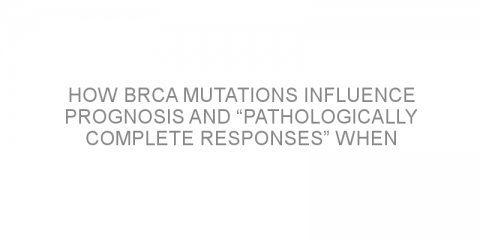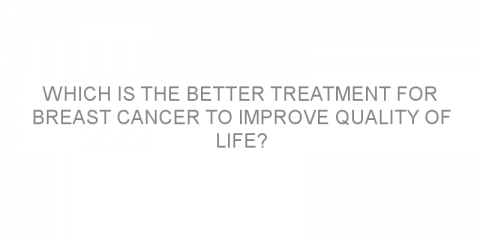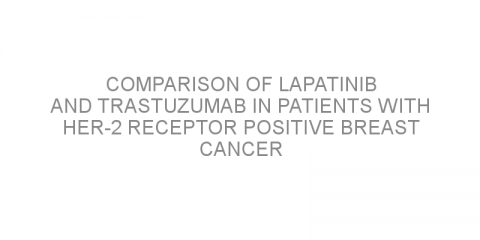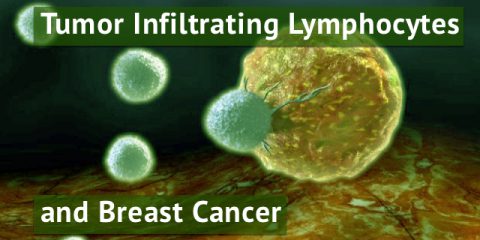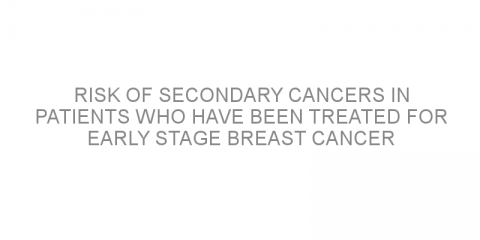In a nutshell The study looked at the effect of BRCA1/BRCA2 mutations (abnormal genes) on the outcomes of patients treated for breast cancer. The study concluded that the patients who had the BRCA1/2 mutations were more responsive to treatment. Some background BRCA1 and BRCA2 are genes that stop tumors from being produced in the body. In some...
Read MoreBreast cancer Posts on Medivizor
Which is the better treatment for breast cancer to improve quality of life?
In a nutshell This study aimed to find out if the quality of life after treatment was different in women who had whole breast irradiation (radiation treatment to the whole breast) for early breast cancer compared to women who had accelerated partial breast irradiation (short radiation treatment to part of the breast) with brachytherapy. The...
Read MoreChemotherapy options for metastatic triple negative breast cancer
Methods and Findings The study looked at female patients with metastatic TNBC. They had not had any previous treatment. Three different combinations of chemotherapy were assessed. Nab-paclitaxel + carboplatin (PC), gemcitabine + carboplatin (GC), and nab-paclitaxel + gemcitabine (PG). 191 patients were randomly assigned one of the three...
Read MoreUsing palbociclib alone or with other therapies in advanced ER+ breast cancer
In a nutshell This study aimed to find out if the breast cancer treatment palbociclib (Ibrance) works better alone, or in combination with other endocrine therapies (drugs which act on hormone receptors) used to treat estrogen receptor positive (ER+ – a hormone receptor found on the tumor) breast cancer. The authors found that treating women...
Read MoreBreast-conserving surgery with radiation compared to total mastectomy
In a nutshell This study aimed to compare the effectiveness of breast conserving surgery and radiotherapy with mastectomy in the treatment of breast cancer. The authors found that the patients who had breast conserving therapy with radiation survived longer than those who had mastectomy. Some background The treatment options for breast...
Read MoreAlopecia after breast cancer treatment
In a nutshell This study aimed to find out how common persistent hair loss (alopecia) is after breast cancer chemotherapy, and how to prevent it. The authors found that persistent alopecia was present in all forms of chemotherapy but was worse with docetaxel (Taxotere) and could be prevented by using a scalp cooling technique. Some background...
Read MoreComparison of lapatinib and trastuzumab in patients with HER-2 receptor positive breast cancer
In a nutshell This study aimed to compare lapatinib (Tykerb) and trastuzumab (Herceptin) in patients with HER-2 receptor positive breast cancer. This study found that in patients with hormone receptor-positive tumors, use of lapatinib for 6 months, followed by trastuzumab for 12 months significantly improved survival...
Read MoreAdding Platinum agents to Chemotherapy for Triple Negative Breast Cancer Patients
In a nutshell This study was a meta-analysis (a review of all the relevant research) on the use of platinum-based chemotherapy in triple-negative breast cancer (TNBC). Authors concluded that platinum-based chemotherapy is highly effective in this type of breast cancer. Some background Triple-negative breast cancer (TNBC) is breast cancer that does not...
Read MoreIn the News: Tumor Infiltrating Lymphocytes and Breast Cancer
This past week a big announcement came from the National Institutes of Health. Dr. Steven Rosenberg, the leading authority on immunotherapy, a treatment he pioneered that uses a person’s own immune cells to fight cancer, told the world about Judy Perkins. In 2003 at age 38, Judy was diagnosed with stage 0 breast cancer. “At the time I was...
Read MoreImpact of surgery for early-stage invasive breast cancer
In a nutshell This study aimed to evaluate patients treated for early stage breast cancer in terms of overall survival and recurrence risks. Among patients with early-stage breast cancer; clinical outcomes more than 10 years after diagnosis did not differ between breast-conserving therapy plus radiation or mastectomy plus radiation...
Read MoreImpact of weight loss on insulin resistance in breast cancer survivors
In a nutshell This study aimed to evaluate the effects of a behavior-based weight loss program on insulin resistance for breast cancer survivors. This study found that breast cancer survivors who achieved 5% or more weight loss saw a significant reduction of insulin resistance. Some background Breast cancer survivors with excess weight are more...
Read MoreRisk of secondary cancers in patients who have been treated for early stage breast cancer
In a nutshell This study aimed to examine the risk of developing a secondary cancer after breast conserving therapy for early stage breast cancer patients. This study found that patients who have been treated for early stage breast cancer do not have a significantly higher risk of secondary cancers. Some background Women with early stage breast...
Read More
